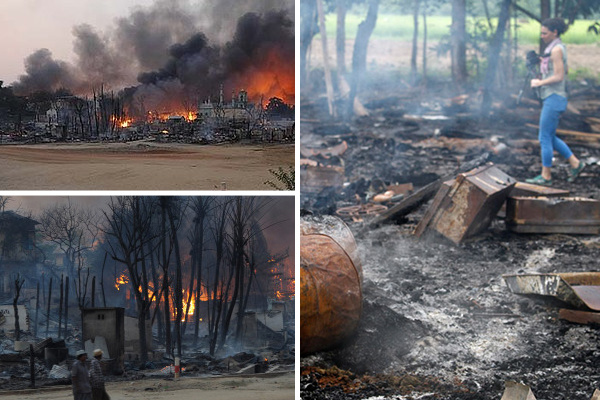
Violent Disputes Between Muslims and Buddhists Continue to Rock Myanmar
- By Alison Lesley --
- 14 Oct 2013 --

Damages throughout the past year of violence in Myanmar
A coastal town near Thandwe in Myanmar, where the president was scheduled to visit on his tour of Rakhine state, has been ravaged by violence in recent days. Muslim families had to flee and hide in the forests of western Myanmar, after the killing of a 94 year old woman and the burning of dozens of homes the previous day. This was carried out by mobs of rampaging Buddhists. In the wake of these events, new concerns have been raised regarding the government’s failure to prevent anti-Muslim attacks or to do anything to protect this minority.
Although the village north of Thandwe was heavily occupied by security forces on the day before, in anticipation of the president’s visit, the soldiers on hand and the police made no effort to step in to protect the villagers and their homes.
According to a police officer, Kyaw Naing, over 700 rioters with swords swinging took over the streets. The elderly Muslim woman, who was killed, died of stab wounds. He estimated that between 70 – 80 houses were set on fire and burned.
According to another police officer, who wishes to remain anonymous, Shwe Hlay, another village about 10 miles from Thandwe, was also attacked by rioters. There were smoldering buildings and several injured Buddhist Rakhines were observed on the scene.
Someone said that a small mosque was burned, but as of now there has been no confirmation.
“Many including women and children are still hiding,” Myo Min, a state government official, said. “They need food and water and Muslim elders are discussing with authorities [how] to evacuate them or send food.”
According to Myo Min, President Thein Sein visited both displaced Muslims and Buddhists in their camps early on Wednesday.
Hundreds of people have been killed and more than 140,000 have had to flee their homes with the vast majority of these being Muslims. What began in Rakhine in June 2012 as sectarian clashes has turned into an anti-Muslim campaign that has spread to towns and villages nationwide.
Those most often targeted have been ethnic Rohingya Muslims because so many people in the country are misinformed and think they are illegal migrants from Bangladesh. However many are from families that have lived there for generations.
Even when their citizenship is commonly recognized, Muslims are being targeted. In the latest flare-up this week, the victims were Kamans, a minority whose citizenship is not in question.
According to a state government spokesman, the trouble began when a Buddhist taxi driver reported that he’d been verbally abused by a Muslim shop owner while he was trying to park his vehicle. Within hours rocks were being thrown at the shop owner’s home. As the anger escalated the violence continued into the morning. As a result two homes owned by Muslim families were burned to the ground.
Thein Sein’s government has been accused by rights groups of having done little to crack down on religious intolerance. The government has failed to bridge the divide between warring religious factions and as a result hundreds of thousands of Muslims are marginalized. For those who have been displaced they continue to be trapped in prison-like camps.
A campaign led by Buddhists, called “969” has evolved nationwide. Those that support the group urge other Buddhists to only shop at Buddhist owned stores and to avoid associating with, marrying, hiring or selling their homes or land to Muslims.
Some critics blame the government and society in general for failing to speak out against discrimination and the ensuing violence, claiming they’ve failed to do anything to prevent the violence from continuing. Others blame radical monks for helping to fuel the crisis by accusing Muslims for threatening Buddhist traditions and culture.
“Political, religious and community leaders need to condemn hate speech. Otherwise, this issue could come to define the new Myanmar, tarnishing its international image and threatening the success of its transition away from decades of authoritarianism,” said Jim Della-Giacoma of the International Crisis Group said in a statement.
Around 4 percent of Myanmar’s population is Muslim. Blame has been placed mainly on Muslims, even though they are the main victims of the recent clashes. In a controversial stance, members of the Buddhist community have been declared innocent.




















